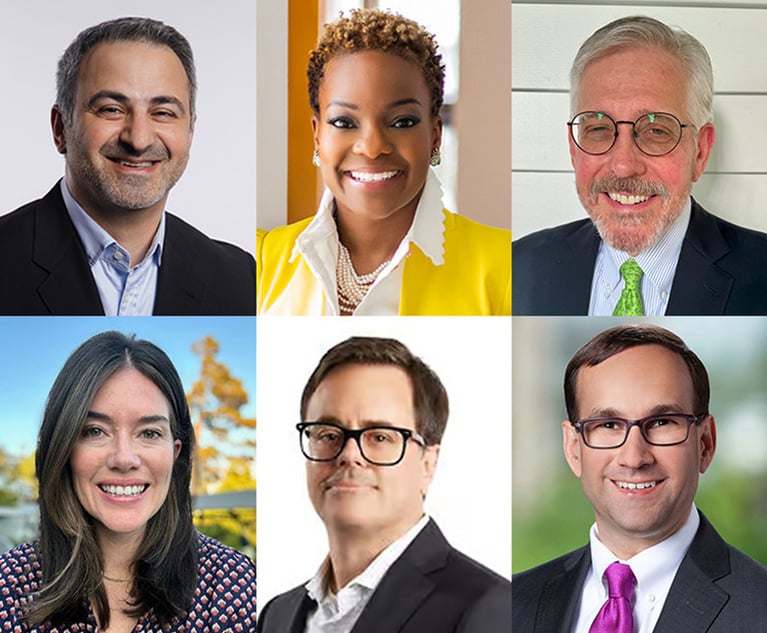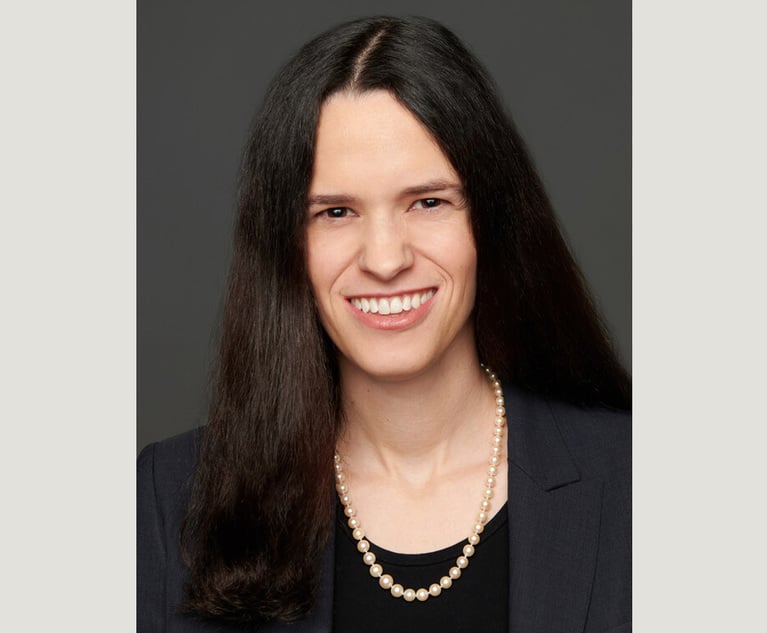An inside look at what GCs want
Two events give insight into the mindset of in-house professionals
April 29, 2012 at 08:00 PM
2 minute read
As the editor of InsideCounsel, I sometimes have the opportunity to speak to different groups of people about the corporate in-house legal profession. For the most part, I discuss what we at InsideCounsel are observing within the profession—be it a shift in the regulatory environment, the increased use of alternative fee arrangements or simply the greater use of various best practices, to name a few. Since the beginning of the year, that opportunity has come up twice, and I happily obliged.
At these two events—both catering to legal marketing professionals—I moderated panels of general counsel who discussed building and maintaining healthy relationships with their outside firms. At InsideCounsel, we have covered the relationship between in-house and outside counsel for years. In fact, in our March issue, our cover story, “Small Wonder,” focused on best practices for GCs looking to hire small or regional law firms. So the topic was appropriate for me, and timely for the speakers as well as the audience.
Both sessions turned into lively conversations between the in-house panelists and the engaged audience. Topics discussed included understanding the GC's business, managing cost and how it relates to law firms, how law firms can best communicate their messages to in-house counsel, and the best tools and technology for efficient collaboration.
The big takeaways from these sessions were that most in-house counsel—particularly general counsel—are first business people, and second lawyers. They want their firms to keep them abreast of important issues and protect their interests but not waste their time.
At the Legal Marketing Association's annual conference, one of the key quotes of the session titled “How GC-Law Firm Collaboration Leads to Success” came from Jeff Carr, SVP, GC and secretary of FMC Technologies Inc. Carr said, while talking to one of his outside lawyers, the gentleman summed up exactly how Carr wants to be viewed by his firms. “He said to me, 'Jeff, you are my most important and least significant client,'” Carr recalled, explaining that he meant FMC's business remains top of mind to the lawyer while the company mostly stays out of trouble.
Although both of these sessions were directed at legal marketers, who learned a lot from the content, the GCs themselves clearly learned a lot from one another. And it was a pleasure to be a part of both of these panels.
This content has been archived. It is available through our partners, LexisNexis® and Bloomberg Law.
To view this content, please continue to their sites.
Not a Lexis Subscriber?
Subscribe Now
Not a Bloomberg Law Subscriber?
Subscribe Now
NOT FOR REPRINT
© 2025 ALM Global, LLC, All Rights Reserved. Request academic re-use from www.copyright.com. All other uses, submit a request to [email protected]. For more information visit Asset & Logo Licensing.
You Might Like
View All
Advertising Tech Likely to Draw More Scrutiny in 2025 Over Consumers' Data, Lawyers Say
5 minute read

'Be Comfortable Being Uncomfortable': Pearls of Wisdom From 2024 GC Q&As

In-House Moves of the Month: Boeing Loses Another Lawyer, HubSpot Legal Chief Out After 2 Years
5 minute readTrending Stories
- 1'Pickier' Law Firms Did Mergers At Same Rate Last Year as 2023
- 2Boxing Promoter Don King Hit With $3B Lawsuit Over Cancellation of 'Rumble in the Jungle 2'
- 3Letter From London: 5 Predictions for Big Law in 2025, Plus 5 More Risky Ones
- 4Crypto Groups Sue IRS Over Decentralized Finance Reporting Rule
- 5Jenner Brings Back Zachary Schauf from DOJ's Office of Legal Counsel
Who Got The Work
Michael G. Bongiorno, Andrew Scott Dulberg and Elizabeth E. Driscoll from Wilmer Cutler Pickering Hale and Dorr have stepped in to represent Symbotic Inc., an A.I.-enabled technology platform that focuses on increasing supply chain efficiency, and other defendants in a pending shareholder derivative lawsuit. The case, filed Oct. 2 in Massachusetts District Court by the Brown Law Firm on behalf of Stephen Austen, accuses certain officers and directors of misleading investors in regard to Symbotic's potential for margin growth by failing to disclose that the company was not equipped to timely deploy its systems or manage expenses through project delays. The case, assigned to U.S. District Judge Nathaniel M. Gorton, is 1:24-cv-12522, Austen v. Cohen et al.
Who Got The Work
Edmund Polubinski and Marie Killmond of Davis Polk & Wardwell have entered appearances for data platform software development company MongoDB and other defendants in a pending shareholder derivative lawsuit. The action, filed Oct. 7 in New York Southern District Court by the Brown Law Firm, accuses the company's directors and/or officers of falsely expressing confidence in the company’s restructuring of its sales incentive plan and downplaying the severity of decreases in its upfront commitments. The case is 1:24-cv-07594, Roy v. Ittycheria et al.
Who Got The Work
Amy O. Bruchs and Kurt F. Ellison of Michael Best & Friedrich have entered appearances for Epic Systems Corp. in a pending employment discrimination lawsuit. The suit was filed Sept. 7 in Wisconsin Western District Court by Levine Eisberner LLC and Siri & Glimstad on behalf of a project manager who claims that he was wrongfully terminated after applying for a religious exemption to the defendant's COVID-19 vaccine mandate. The case, assigned to U.S. Magistrate Judge Anita Marie Boor, is 3:24-cv-00630, Secker, Nathan v. Epic Systems Corporation.
Who Got The Work
David X. Sullivan, Thomas J. Finn and Gregory A. Hall from McCarter & English have entered appearances for Sunrun Installation Services in a pending civil rights lawsuit. The complaint was filed Sept. 4 in Connecticut District Court by attorney Robert M. Berke on behalf of former employee George Edward Steins, who was arrested and charged with employing an unregistered home improvement salesperson. The complaint alleges that had Sunrun informed the Connecticut Department of Consumer Protection that the plaintiff's employment had ended in 2017 and that he no longer held Sunrun's home improvement contractor license, he would not have been hit with charges, which were dismissed in May 2024. The case, assigned to U.S. District Judge Jeffrey A. Meyer, is 3:24-cv-01423, Steins v. Sunrun, Inc. et al.
Who Got The Work
Greenberg Traurig shareholder Joshua L. Raskin has entered an appearance for boohoo.com UK Ltd. in a pending patent infringement lawsuit. The suit, filed Sept. 3 in Texas Eastern District Court by Rozier Hardt McDonough on behalf of Alto Dynamics, asserts five patents related to an online shopping platform. The case, assigned to U.S. District Judge Rodney Gilstrap, is 2:24-cv-00719, Alto Dynamics, LLC v. boohoo.com UK Limited.
Featured Firms
Law Offices of Gary Martin Hays & Associates, P.C.
(470) 294-1674
Law Offices of Mark E. Salomone
(857) 444-6468
Smith & Hassler
(713) 739-1250






